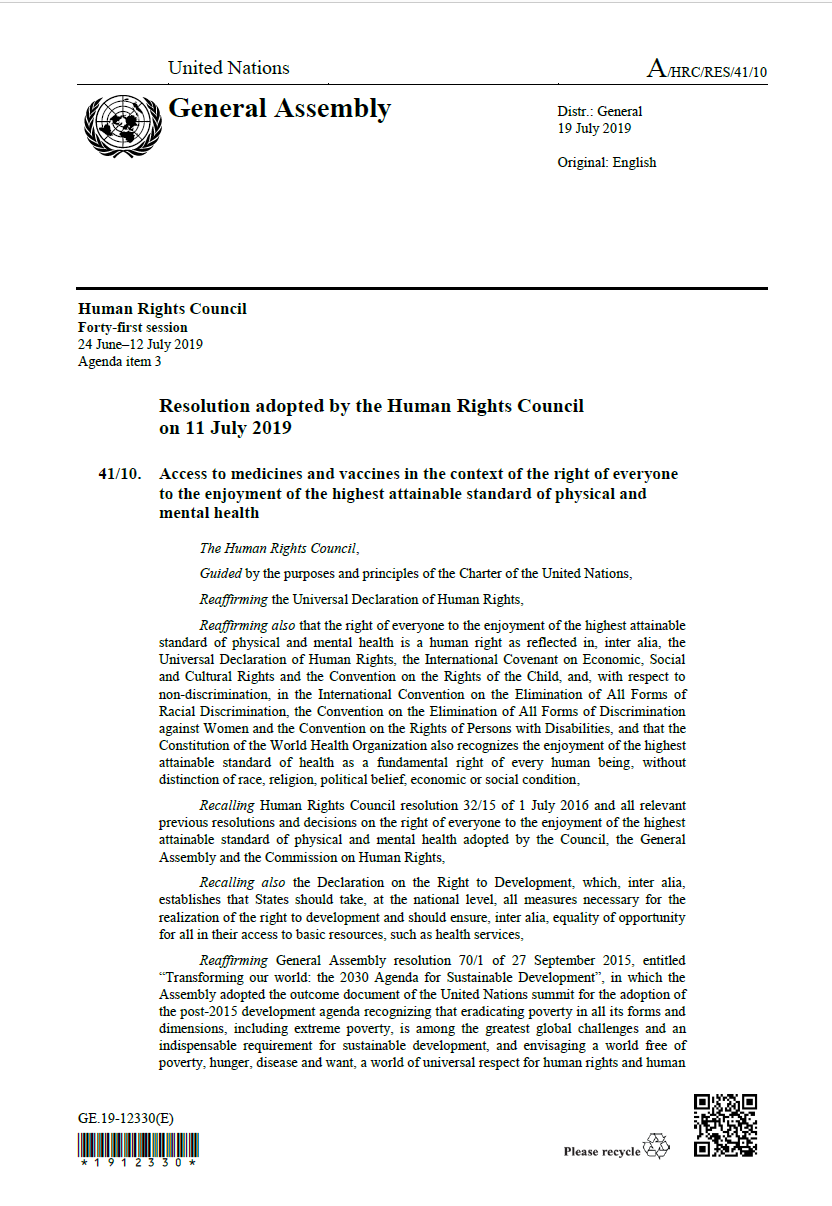2019 HRC Resolution on access to medicines and vaccines
Analysis of precedential value
This UN Human Rights Council (HRC) resolution was adopted without a vote in July 2019. This document was co-drafted by representatives of 27 Member States, 13 of which were not members of the sitting HRC.
The HRC is composed of elected representatives from 47 Member States; together, they are responsible for coordinating investigations of and responses to human rights violations.
Used as precedent
access to health products, pharmaceutical transparency
“Reaffirming the importance of improving the transparency of markets for medicines, vaccines and other health products across the whole value chain, and taking into consideration resolution WHA72.8 adopted by the World Health Assembly at its seventy-second session” (p. 2)
access to health products
“Seriously concerned about the high prices of some health products and the inequitable access within and among Member States, as well as the financial hardships associated with high prices, which impede progress towards achieving universal health coverage for all” (pp. 2–3)
“Expressing deep concern at recent outbreaks of highly infectious pathogens with pandemic potential, which demonstrate the potential vulnerability of populations to them, and in this context reaffirming and underscoring the importance of research into and development of new and innovative medicines and vaccines and of ensuring access to safe, affordable, effective and quality medicines and vaccines to all, including new and innovative medicines, and of building and/or strengthening health system capacities, including primary health care, for detecting, preventing and responding in a timely manner to outbreaks, epidemics, pandemics and other health emergencies” (p. 4)
access to health products, universal health coverage
“Recognizing that universal health coverage implies that all people have access without discrimination to nationally determined sets of needed promotive, preventive, curative, palliative and rehabilitative essential health-care services, and essential, safe, affordable, effective and quality medicines and vaccines, while ensuring that the use of these services does not expose users to financial hardship, with special emphasis on the poor, vulnerable and marginalized segments of the population” (p. 3)
access to health products
“Recognizes that access to medicines and vaccines is one of the fundamental elements for the full realization of the right of everyone to the enjoyment of the highest attainable standard of physical and mental health and the correspondent objectives of universal health coverage and health for all, without discrimination, with special attention to reaching those furthest behind first;” (p. 4)
“Stresses the responsibility of States to ensure access for all, without discrimination, to medicines and vaccines, in particular essential medicines, that are affordable, safe, effective and of quality” (p. 4)
“Calls upon States to promote access to safe, effective, quality and affordable medicines and vaccines for all, including through the use to the full of the provisions of the Agreement on Trade-Related Aspects of Intellectual Property Rights (TRIPS Agreement), which provide flexibility for that purpose, while recognizing that the protection of intellectual property is important for the development of new and innovative medicines and vaccines, and the concerns about its effects on prices and public health” (p. 4)
“Also calls upon States to take steps to implement policies and plans to promote access to comprehensive and cost-effective prevention, treatment and care for the integrated management of non-communicable diseases, including, inter alia, increased access to affordable, safe, effective and quality medicines, vaccines and diagnostics and other health products, including through the full use of TRIPS Agreement provisions and flexibilities” (p. 4)
access to health products, alternative r&d models
“Reiterates the call upon States to continue to collaborate, as appropriate, on models and approaches that support the delinkage of the cost of new research and development from the prices of medicines, vaccines and diagnostics for diseases that predominantly affect developing countries, including emerging and neglected tropical diseases, so as to ensure their sustained accessibility, affordability and availability and to ensure access to treatment for all those in need” (p. 4)
